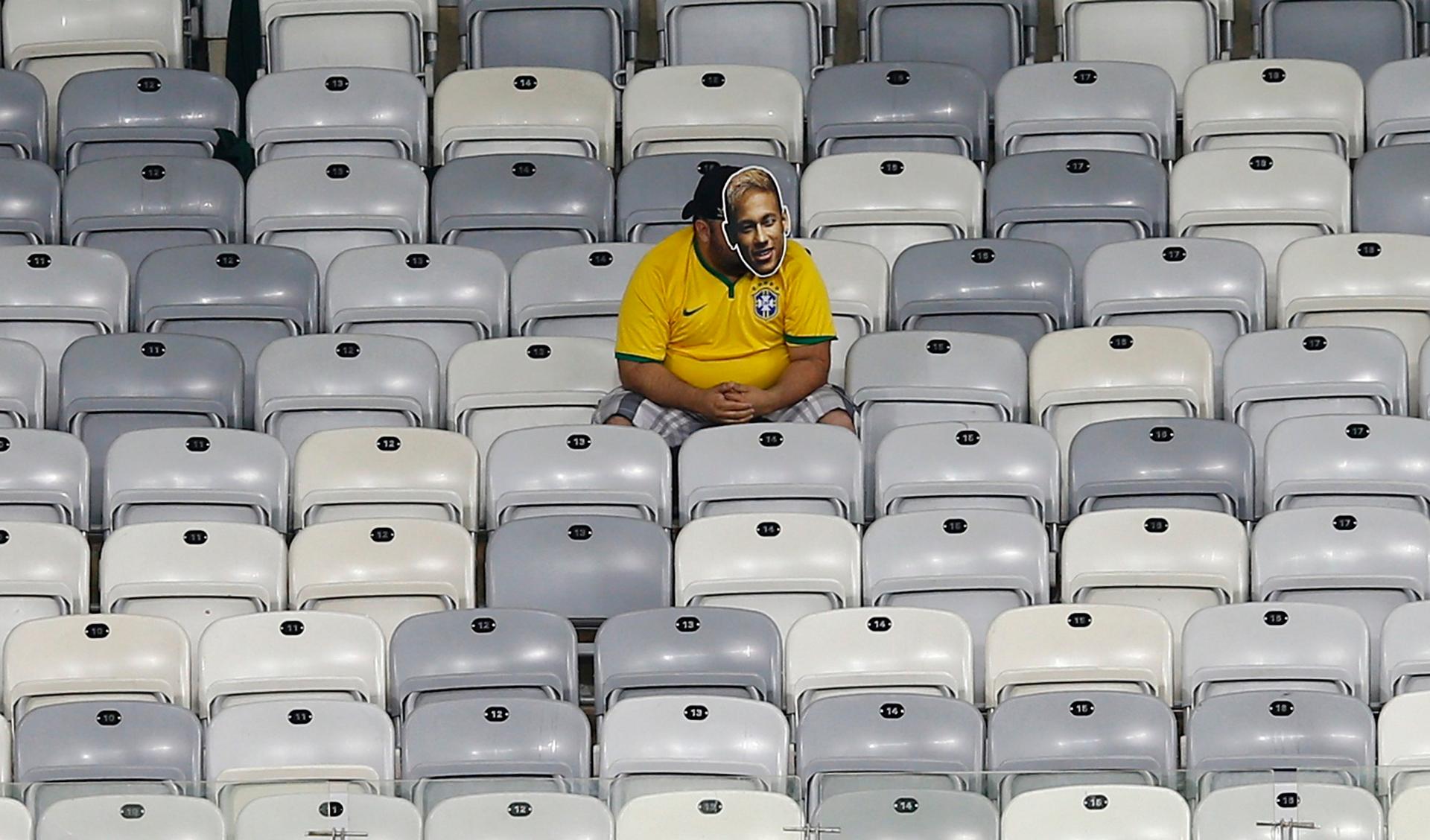A Brazil fan sits alone in the stands at the end of the 2014 World Cup semi-finals against Germany.
How did it go so wrong so quickly?
Brazil was so eager to show itself off to the world. The country spent billions to put on the Cup and Brazilians hoped to win the title at home.
But, how does a loss of this magnitude weigh on the country of 200 million people?
It could bounce back and create a more powerful team. Or, the events on the pitch could trickle into the political arena.
There's already talk that Brazilian President Dilma Rousseff could lose her re-election come October.
There will be repercussions, says Franklin Foer, author of "How Soccer Explains the World."
"The Brazilian elite were so determined to put on this big show for the world," Foer says. "I do believe they will be punished in some sort of way for spending such wild sums of money on a spectacle that was not accompanied in the end by a Brazilian triumph."
Lessons could be learned from the team that crushed them: Germany.
Foer says that Germany, after failing to qualify for the 2000 European championships, attacked the problem by retooling the team and changing strategy on the field.
"And that was exactly what was on display when they thrashed Brazil," Foer says.
Then there's Harold Wilson, former prime minister of the United Kingdom, who stayed in power after his country won the World Cup in 1966. But, when the country lost four years later, says Foer, Wilson lost his hold on power.
And Brazil?
The Brazilian system is afflicted by corruption, said Foer. "It's run by a bunch of oligarchs who pad their own pockets and sell players to European clubs in order to make a profit."
These are not just members of the Brazilian Soccer Federation, he adds.
"This trickles down throughout the entire ecosystem of the sport," Foer says. "So you have club owners who are corrupt, agents who are corrupt, journalists … who are complicit and politicians."
Foer suggests that over time, the alleged corruption has resulted in some very bad investments that the country has made.
"Those bad investments have hindered economic growth, and also the country's soccer growth, because youth and talent are not nurtured the way they should," he says.
How did it go so wrong so quickly?
Brazil was so eager to show itself off to the world. The country spent billions to put on the Cup and Brazilians hoped to win the title at home.
But, how does a loss of this magnitude weigh on the country of 200 million people?
It could bounce back and create a more powerful team. Or, the events on the pitch could trickle into the political arena.
There's already talk that Brazilian President Dilma Rousseff could lose her re-election come October.
There will be repercussions, says Franklin Foer, author of "How Soccer Explains the World."
"The Brazilian elite were so determined to put on this big show for the world," Foer says. "I do believe they will be punished in some sort of way for spending such wild sums of money on a spectacle that was not accompanied in the end by a Brazilian triumph."
Lessons could be learned from the team that crushed them: Germany.
Foer says that Germany, after failing to qualify for the 2000 European championships, attacked the problem by retooling the team and changing strategy on the field.
"And that was exactly what was on display when they thrashed Brazil," Foer says.
Then there's Harold Wilson, former prime minister of the United Kingdom, who stayed in power after his country won the World Cup in 1966. But, when the country lost four years later, says Foer, Wilson lost his hold on power.
And Brazil?
The Brazilian system is afflicted by corruption, said Foer. "It's run by a bunch of oligarchs who pad their own pockets and sell players to European clubs in order to make a profit."
These are not just members of the Brazilian Soccer Federation, he adds.
"This trickles down throughout the entire ecosystem of the sport," Foer says. "So you have club owners who are corrupt, agents who are corrupt, journalists … who are complicit and politicians."
Foer suggests that over time, the alleged corruption has resulted in some very bad investments that the country has made.
"Those bad investments have hindered economic growth, and also the country's soccer growth, because youth and talent are not nurtured the way they should," he says.
